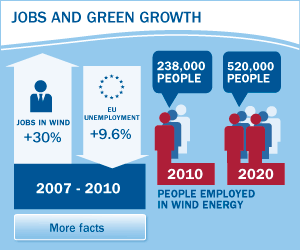 This week, from 4-7 February, Vienna is a hive of wind energy activity as delegates from across the sector and from the world over descend on the city for EWEA’s 2013 Annual Event. But what is this year’s event all about, and why should you attend or follow updates on EWEA’s blog? We spoke to Julian Scola, EWEA’s Communication Director, and Malgosia Bartosik, EWEA’s Events Director, to find out.
This week, from 4-7 February, Vienna is a hive of wind energy activity as delegates from across the sector and from the world over descend on the city for EWEA’s 2013 Annual Event. But what is this year’s event all about, and why should you attend or follow updates on EWEA’s blog? We spoke to Julian Scola, EWEA’s Communication Director, and Malgosia Bartosik, EWEA’s Events Director, to find out.
What do you expect the hot topics of the event to be?
Julian: Wind energy, like most sectors across Europe, is clearly experiencing tough times. There’s the undercurrent of economic strife and governments have wobbled in their support for renewables in general which has created investor uncertainty. With this background, I think there will be two key debates at EWEA 2013: where the new markets are, in particular the promising growth rates in eastern and central Europebut also beyond Europe; and finance. The financial crisis has meant that banks and utilities that used to lend to wind no longer do so. The sector is therefore looking to new financial horizons like pension funds and insurers. New sources of finance are coming into the market but there is still a lack of understanding and communication between the two worlds – EWEA 2013’s finance track will feature discussions that will begin to close that gap.
Why should I attend?
continue reading »
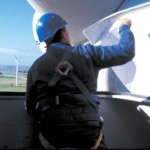 Wind energy is expanding across Europe – currently the continent has over 100 GW of wind energy capacity with levels set to rise as the EU continues on its path to a 20% share of renewable energy by 2020, but the expansion in the number of skilled workers the sector requires is not keeping up.
Wind energy is expanding across Europe – currently the continent has over 100 GW of wind energy capacity with levels set to rise as the EU continues on its path to a 20% share of renewable energy by 2020, but the expansion in the number of skilled workers the sector requires is not keeping up.
TPWind – wind energy’s research and development platform – is set to release new statistics at the European Wind Energy Association’s 2013 Annual Event in Vienna early February revealing just how deep the skills shortage runs today, and is likely to run in the future.
Engineers are in short supply, especially in operations and maintenance, the statistics will show.
continue reading »
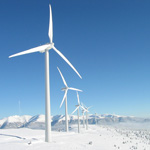 Freezing temperatures in both Belgium and Germany have put both countries’ power systems to the test this week, but neither country has experienced electricity blackouts despite the lack of nuclear power.
Freezing temperatures in both Belgium and Germany have put both countries’ power systems to the test this week, but neither country has experienced electricity blackouts despite the lack of nuclear power.
Two of Belgium’s seven nuclear reactors – Doel 3 and Tihange 2 – were switched off this summer, following the discovery of cracks, cutting 2,000 MW of electricity-generating capacity from Belgium’s electricity network. Even without this nuclear capacity online, the network survived this winter’s peak electricity demand of 13,166 MW on 17 January, L’Echo, a Belgian newspaper, reported.
Belgium’s electricity supply is guaranteed by a small amount of energy imports – including gas from the Netherlands and solar and wind from Germany – and a diverse energy portfolio, one in which renewable energy has a rising share, the paper said.
continue reading »
 Comments Off on Belgian and German electricity systems keep lights on despite nuclear turn-off
Comments Off on Belgian and German electricity systems keep lights on despite nuclear turn-off
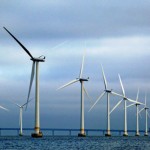 Still reeling from the earthquake and tsunami that destroyed the Fukushima nuclear plant in 2011, Japan has announced its intention to build what could become the world’s largest offshore wind farm.
Still reeling from the earthquake and tsunami that destroyed the Fukushima nuclear plant in 2011, Japan has announced its intention to build what could become the world’s largest offshore wind farm.
New Scientist reported last week that the world’s third largest economy plans to build by 2020 an offshore wind farm with 143 turbines 16 kilometres from the destroyed Daiichi nuclear reactor.
The new wind farm will generate 1 gigawatt of power once completed, the magazine said, adding it is part of a Japanese plan to increase renewable energy resources following the post-tsunami shutdown of the nation’s 54 nuclear reactors. Currently, two of those reactors have come back online.
“The project is part of the Fukushima region’s plan to become completely energy self-sufficient by 2040, using renewable sources alone,” the article said.
continue reading »
 Comments Off on World’s largest offshore wind farm planned for Japanese waters
Comments Off on World’s largest offshore wind farm planned for Japanese waters
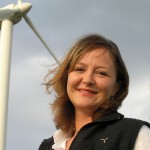 Wind energy can be controversial when it comes to public acceptance, even if opinion polls show the public are largely in favour. We talk to Anna Stanford, Public Affairs Manager at RES and Lead Session Chair at EWEA 2013 in Vienna next month, to get the low-down on the issues and the solutions.
Wind energy can be controversial when it comes to public acceptance, even if opinion polls show the public are largely in favour. We talk to Anna Stanford, Public Affairs Manager at RES and Lead Session Chair at EWEA 2013 in Vienna next month, to get the low-down on the issues and the solutions.
Have public acceptance issues risen over the last few years?
I’ve been working in the wind industry in the UK since 1992 and wind energy has always been controversial, polarising opinion at both a local community and national political level. Groups set up specifically to oppose wind have been active consistently since then and have influenced politicians and the media; ironically over the same period opinion polls have shown that public support for wind has remained consistently high.
While back then other markets did not seem to be experiencing the same level of controversy as the UK, this has changed, with anti-wind groups becoming increasingly well-organised globally and active in key markets (for example France, Canada and Australia). In the UK, while the majority of the public remain supportive of wind energy, it remains controversial and the issue is increasingly combative on the national political stage.
Why do you think this has occurred?
continue reading »
 This week, from 4-7 February, Vienna is a hive of wind energy activity as delegates from across the sector and from the world over descend on the city for EWEA’s 2013 Annual Event. But what is this year’s event all about, and why should you attend or follow updates on EWEA’s blog? We spoke to Julian Scola, EWEA’s Communication Director, and Malgosia Bartosik, EWEA’s Events Director, to find out.
This week, from 4-7 February, Vienna is a hive of wind energy activity as delegates from across the sector and from the world over descend on the city for EWEA’s 2013 Annual Event. But what is this year’s event all about, and why should you attend or follow updates on EWEA’s blog? We spoke to Julian Scola, EWEA’s Communication Director, and Malgosia Bartosik, EWEA’s Events Director, to find out.